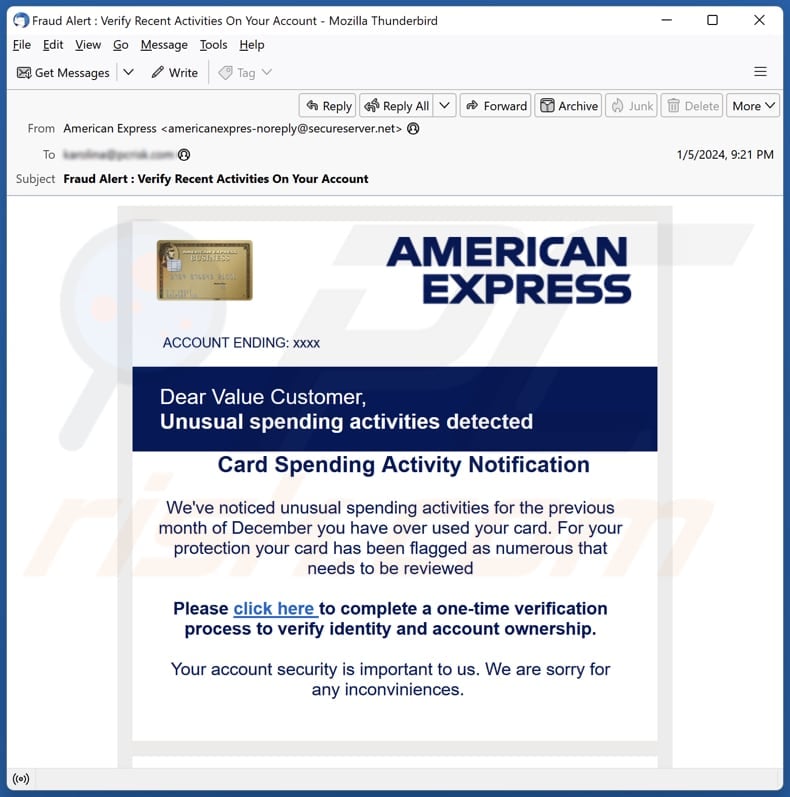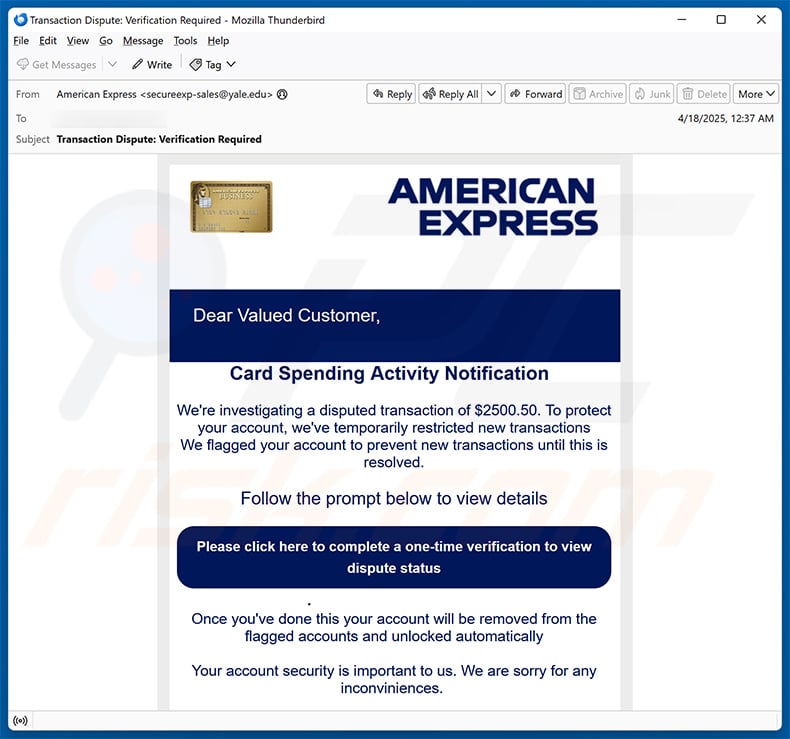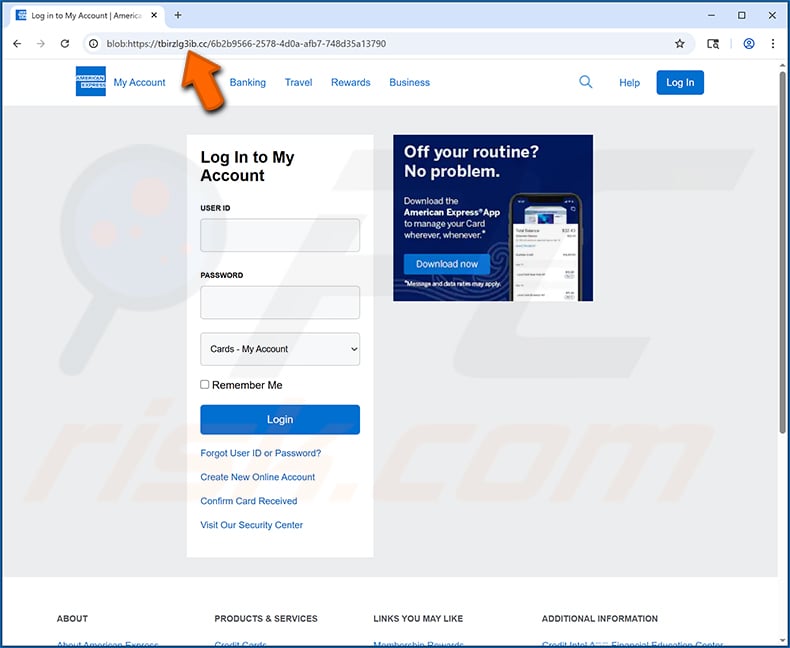How to identify scams like "American Express - Unusual Spending Activities Detected"
Phishing/ScamAlso Known As: American Express - Unusual Spending Activities Detected phishing email
Get free scan and check if your device is infected.
Remove it nowTo use full-featured product, you have to purchase a license for Combo Cleaner. Seven days free trial available. Combo Cleaner is owned and operated by RCS LT, the parent company of PCRisk.com.
What is "American Express - Unusual Spending Activities Detected"?
Upon reviewing the email, it is evident that it is a phishing attempt disguising itself as a notification from American Express regarding suspicious account activities. The scammers orchestrating this phishing scheme intend to deceive recipients into opening the provided link and divulging personal information on a fraudulent webpage.

More about the "American Express - Unusual Spending Activities Detected" scam email
This phishing email purports to be a notification from American Express regarding unusual spending activities. It claims that the recipient has overused their card in the previous month of December, prompting the card to be flagged for review.
To purportedly ensure account security, the recipient is urged to click on a provided link to complete a one-time verification process for identity and account ownership. The email falsely claims to be from The American Express Fraud Protection Team and apologizes for any inconvenience, aiming to trick the recipient into providing personal information on a fraudulent website.
In most cases, scammers orchestrating emails of this nature intend to obtain sensitive information such as credit card details, login credentials (e.g., email addresses, usernames, and passwords), social security numbers, or other personal data.
This information can be exploited for various malicious purposes, including unauthorized transactions, identity theft, and other fraudulent activities. In order to protect personal and financial security, it is crucial for recipients to exercise caution, refrain from clicking on suspicious links in emails of this kind, and avoid entering information on dubious pages.
| Name | American Express - Unusual Spending Activities Detected Email Scam |
| Threat Type | Phishing, Scam, Social Engineering, Fraud |
| Fake Claim | Suspicious activity in American Express account has been detected |
| Disguise | Notification from American Express |
| Symptoms | Unauthorized online purchases, changed online account passwords, identity theft, illegal access of the computer. |
| Distribution methods | Deceptive emails, rogue online pop-up ads, search engine poisoning techniques, misspelled domains. |
| Damage | Loss of sensitive private information, monetary loss, identity theft. |
| Malware Removal (Windows) |
To eliminate possible malware infections, scan your computer with legitimate antivirus software. Our security researchers recommend using Combo Cleaner. Download Combo CleanerTo use full-featured product, you have to purchase a license for Combo Cleaner. 7 days free trial available. Combo Cleaner is owned and operated by RCS LT, the parent company of PCRisk.com. |
Similar scam emails in general
Phishing emails commonly exhibit deceptive sender information, urgency in their content, and a request for sensitive information. They often employ tactics like mimicking reputable organizations or using alarming language to prompt quick action.
Additionally, phishing emails frequently contain malicious links or attachments that, when interacted with, can lead to security breaches or the installation of malware. Staying vigilant and verifying the legitimacy of unexpected emails can help users avoid falling victim to phishing attacks.
Examples of phishing emails: "Payroll Sheet", "Issue With The Billing Information", and "LOTERIA NAVIDAD 2023".
How do spam campaigns infect computers?
Users can inadvertently infect their computers through email by interacting with malicious elements embedded in deceptive messages. Phishing emails often employ tactics such as disguising as legitimate entities or creating a sense of urgency, prompting users to click on malicious links or open infected attachments.
Once clicked or opened, these elements can initiate the download and execution of malware, compromising the user's system. Malicious actors commonly utilize diverse file types, including executables, infected documents such as PDFs or Microsoft Office files, ISO files, JavaScript files, and compressed archives like ZIP or RAR files, as carriers for disseminating malware.
How to avoid installation of malware?
Enhance your computer's security by maintaining regular updates for both software and operating systems. Utilize trusted antivirus software and exercise vigilance when dealing with links or attachments in emails. Exercise caution when visiting websites, especially those that appear suspicious, and avoid interaction with any ads or pop-ups on such sites.
When downloading files or applications, opt for reliable sources like official websites and app stores to mitigate risks associated with pirated software or unofficial activation tools. Stay well-informed about the latest security threats to take proactive measures in safeguarding your system.
If you have already opened malicious attachments, we recommend running a scan with Combo Cleaner Antivirus for Windows to automatically eliminate infiltrated malware.
Text presented in the "American Express - Unusual Spending Activities Detected" email letter:
Subject: Fraud Alert : Verify Recent Activities On Your Account
American Express Alert - New Additional Card Member
ACCOUNT ENDING: xxxx
Dear Value Customer,
Unusual spending activities detected
Card Spending Activity Notification
We've noticed unusual spending activities for the previous month of December you have over used your card. For your protection your card has been flagged as numerous that needs to be reviewed
Please click here to complete a one-time verification process to verify identity and account ownership.
Your account security is important to us. We are sorry for any inconviniences.
Thank you for your Card Membership.
Sincerely,
The American Express Fraud protection Team
Another variant of an email from "American Express - Unusual Spending Activities Detected" spam campaign:

Text presented within:
Subject: Transaction Dispute: Verification Required
American Express Alert - New Additional Card Member
Dear Valued Customer,
Card Spending Activity Notification
We're investigating a disputed transaction of $2500.50. To protect your account, we've temporarily restricted new transactions
We flagged your account to prevent new transactions until this is resolved.Follow the prompt below to view details
Please click here to complete a one-time verification to view dispute status . unlocked automatically
Once you've done this your account will be removed from the flagged accounts and unlocked automatically
Your account security is important to us. We are sorry for any inconviniences.
Example of a phishing site promoted via "American Express - Unusual Spending Activities Detected" spam campaign:

Instant automatic malware removal:
Manual threat removal might be a lengthy and complicated process that requires advanced IT skills. Combo Cleaner is a professional automatic malware removal tool that is recommended to get rid of malware. Download it by clicking the button below:
DOWNLOAD Combo CleanerBy downloading any software listed on this website you agree to our Privacy Policy and Terms of Use. To use full-featured product, you have to purchase a license for Combo Cleaner. 7 days free trial available. Combo Cleaner is owned and operated by RCS LT, the parent company of PCRisk.com.
Quick menu:
- What is American Express - Unusual Spending Activities Detected phishing email?
- Types of malicious emails.
- How to spot a malicious email?
- What to do if you fell for an email scam?
Types of malicious emails:
![]() Phishing Emails
Phishing Emails
Most commonly, cybercriminals use deceptive emails to trick Internet users into giving away their sensitive private information, for example, login information for various online services, email accounts, or online banking information.
Such attacks are called phishing. In a phishing attack, cybercriminals usually send an email message with some popular service logo (for example, Microsoft, DHL, Amazon, Netflix), create urgency (wrong shipping address, expired password, etc.), and place a link which they hope their potential victims will click on.
After clicking the link presented in such email message, victims are redirected to a fake website that looks identical or extremely similar to the original one. Victims are then asked to enter their password, credit card details, or some other information that gets stolen by cybercriminals.
![]() Emails with Malicious Attachments
Emails with Malicious Attachments
Another popular attack vector is email spam with malicious attachments that infect users' computers with malware. Malicious attachments usually carry trojans that are capable of stealing passwords, banking information, and other sensitive information.
In such attacks, cybercriminals' main goal is to trick their potential victims into opening an infected email attachment. To achieve this goal, email messages usually talk about recently received invoices, faxes, or voice messages.
If a potential victim falls for the lure and opens the attachment, their computers get infected, and cybercriminals can collect a lot of sensitive information.
While it's a more complicated method to steal personal information (spam filters and antivirus programs usually detect such attempts), if successful, cybercriminals can get a much wider array of data and can collect information for a long period of time.
![]() Sextortion Emails
Sextortion Emails
This is a type of phishing. In this case, users receive an email claiming that a cybercriminal could access the webcam of the potential victim and has a video recording of one's masturbation.
To get rid of the video, victims are asked to pay a ransom (usually using Bitcoin or another cryptocurrency). Nevertheless, all of these claims are false - users who receive such emails should ignore and delete them.
How to spot a malicious email?
While cyber criminals try to make their lure emails look trustworthy, here are some things that you should look for when trying to spot a phishing email:
- Check the sender's ("from") email address: Hover your mouse over the "from" address and check if it's legitimate. For example, if you received an email from Microsoft, be sure to check if the email address is @microsoft.com and not something suspicious like @m1crosoft.com, @microsfot.com, @account-security-noreply.com, etc.
- Check for generic greetings: If the greeting in the email is "Dear user", "Dear @youremail.com", "Dear valued customer", this should raise suspiciousness. Most commonly, companies call you by your name. Lack of this information could signal a phishing attempt.
- Check the links in the email: Hover your mouse over the link presented in the email, if the link that appears seems suspicious, don't click it. For example, if you received an email from Microsoft and the link in the email shows that it will go to firebasestorage.googleapis.com/v0... you shouldn't trust it. It's best not to click any links in the emails but to visit the company website that sent you the email in the first place.
- Don't blindly trust email attachments: Most commonly, legitimate companies will ask you to log in to their website and to view any documents there; if you received an email with an attachment, it's a good idea to scan it with an antivirus application. Infected email attachments are a common attack vector used by cybercriminals.
To minimise the risk of opening phishing and malicious emails we recommend using Combo Cleaner Antivirus for Windows.
Example of a spam email:

What to do if you fell for an email scam?
- If you clicked on a link in a phishing email and entered your password - be sure to change your password as soon as possible. Usually, cybercriminals collect stolen credentials and then sell them to other groups that use them for malicious purposes. If you change your password in a timely manner, there's a chance that criminals won't have enough time to do any damage.
- If you entered your credit card information - contact your bank as soon as possible and explain the situation. There's a good chance that you will need to cancel your compromised credit card and get a new one.
- If you see any signs of identity theft - you should immediately contact the Federal Trade Commission. This institution will collect information about your situation and create a personal recovery plan.
- If you opened a malicious attachment - your computer is probably infected, you should scan it with a reputable antivirus application. For this purpose, we recommend using Combo Cleaner Antivirus for Windows.
- Help other Internet users - report phishing emails to Anti-Phishing Working Group, FBI’s Internet Crime Complaint Center, National Fraud Information Center and U.S. Department of Justice.
Frequently Asked Questions (FAQ)
Why did I receive this email?
Scammers dispatch identical messages to thousands of recipients, anticipating that someone will be deceived by their fraudulent tactics. These spam emails lack personalization, targeting a broad audience with generic content.
I have provided my personal information when tricked by this email, what should I do?
Depending on the disclosed information, promptly update passwords, notify your bank for account monitoring, and report the incident to the appropriate authorities, depending on the disclosed information.
I have downloaded and opened a malicious file attached to an email, is my computer infected?
If the file was an executable, the risk of infection is more significant. On the other hand, if it was a document like .pdf or .doc, there is a chance you avoided infection, as sometimes merely opening such documents does not lead to malware infiltrating the system.
I have read the email but did not open the attachment, is my computer infected?
No, simply opening an email poses no harm. However, clicking on links within the email or opening attached files can lead to system infections.
Will Combo Cleaner remove malware infections that were present in email attachment?
Combo Cleaner possesses the capability to identify and eradicate nearly all recognized malware infections. It is important to mention that sophisticated malware often conceals itself deep within the system. Therefore, running a full system scan is imperative for effective detection and removal.
Share:

Tomas Meskauskas
Expert security researcher, professional malware analyst
I am passionate about computer security and technology. I have an experience of over 10 years working in various companies related to computer technical issue solving and Internet security. I have been working as an author and editor for pcrisk.com since 2010. Follow me on Twitter and LinkedIn to stay informed about the latest online security threats.
PCrisk security portal is brought by a company RCS LT.
Joined forces of security researchers help educate computer users about the latest online security threats. More information about the company RCS LT.
Our malware removal guides are free. However, if you want to support us you can send us a donation.
DonatePCrisk security portal is brought by a company RCS LT.
Joined forces of security researchers help educate computer users about the latest online security threats. More information about the company RCS LT.
Our malware removal guides are free. However, if you want to support us you can send us a donation.
Donate
▼ Show Discussion